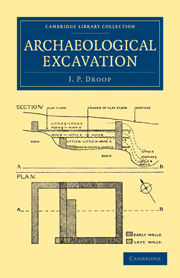Summary
Digging
General principles it is easy enough to state, but the matter is not so simple when it comes to the particular question, By what means are objects best found and made to yield up their story? The answer comes in the form of another principle nearly as general as its predecessors. An excavation should be so conducted that it would be possible in theory to build up the site again with every object replaced exactly in its original position. For it is not until after excavation has disclosed fully what may be called the geological nature of the site, the original contours of the virgin soil, and the source and order of the subsequent accumulations, that reasoned conclusions can be formed as to the history of the objects found; and these conclusions cannot be formed, or at least cannot be formed with the same certainty, if the relations of the individual finds either with one another or with the geological conditions are not accurately known. Should the objects have been taken out in a higgledy-piggledy manner no subsequent knowledge of the history of the accumulations will be of much avail, and instead of having evidence from stratification the student will be reduced to evidence from style. And this may mean that all that he can say with certainty about the site will be the fruit of his previous knowledge.
- Type
- Chapter
- Information
- Archaeological Excavation , pp. 7 - 33Publisher: Cambridge University PressPrint publication year: 2010First published in: 1915



